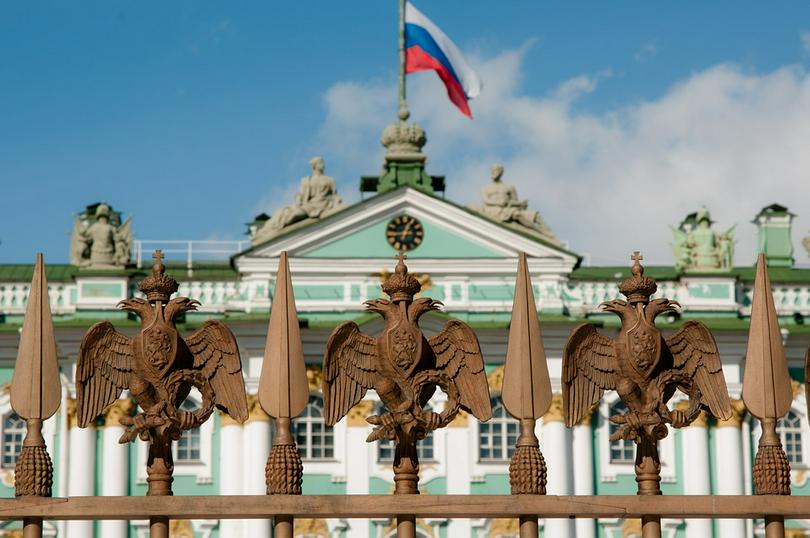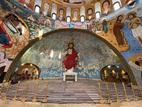The Baptist "House of Peace" in Kaliningrad
Berlin - On festive occasions at Kaliningrad/Russia's Baptist church, one is reminded of the best of times back in the former USSR. Then, as many as 600 persons crowd into the "Church of Peace"; a four-part choir hails forth; children and women recite poetry and sing. Two or three sermons are to be expected; adult males and children are visible throughout. As many as 500 persons frequently visit the Sunday morning services; roughly 25% of the participants are minors.
This imposing, round church was dedicated in a very festive hour on 23 August 1998. The 700 participants in the Ulitsa Gagarina 18 behind the "Kings Gate" in the east of the city then included 100 guests from Germany.
Pastor Anatoly Krikun is very pleased to have a "Bible college". This state-recognized institution was founded in 1999 and usually has approx. 20 students. Its study program consists of five two-week study blocks held five times annually for a three-year period. Theology and music courses are offered; women are trained as Sunday school teachers. Visiting lecturers from Germany are often present. Thanks largely to the college, a guest house has been built next to the large "prayer house". Foreign guests are welcome to sleep there for a modest fee.
Numbers are erratic, but one speaks of 800 to 870 Baptists in Kaliningrad region. Yet the Master's thesis of the Russian-German Alex Breitkreuz from 2006 reports on only 426 members in registered congregations, 318 of those in Kaliningrad's Church of Peace. Other small congregations exist in Bagrationovsk, Sovietsk, Gussev, Mamonovo and Gromovo near Slavsk. The congregation in Sovietsk (Tilsit in German) even has its own building. A second Baptist congregation also exists in the north of Kaliningrad: The gathering in Ulitsa Lomonossov 54 has roughly 60 members.
Barely noticed are the reclusive and small gatherings of the "Initiativniki", the 1961-founded denomination of non-registered, "underground" Baptists. They are present in Kaliningrad as well as in Yasnaya Polyana, which is the once-German "horse paradise" of Trakhenen. Breitkreuz reported that the Initiativniki could point to as many as 300 members in the enclave in 2004. A Russian-language webpage, "map.drevolife.ru", even lists 11 congregations for them in the Kaliningrad region.
In German times, Königsberg had six larger Baptist congregations and was considered a hotbed of Baptist activity. Today, Baptists no longer have access to any church building stemming from German times. According to the Baptist Vadim Lugov, Kaliningrad currently has Protestant congregations meeting at 24 locations.
The first native Russian Baptists arrived in the enclave in 1947 - two years after its takeover by the Soviet Union. Interesting is the fact that the Baptists were legally registered as a religious entity in this region many years prior to any other denomination. That occurred in 1967 - 18 years before the registration of the Orthodox! This is cited on the congregation's webpage ("mir-kld.ru") as well as in the Master's thesis of Pastor Anatoly Krikun, which was published in 2011. Its title, translated, is: "The History of Evangelical Christians - Baptists in Eastern Prussia and Kaliningrad Region".
But only on the third try did the Baptists succeed in dedicating a new, small house of prayer in the city on 12 August 1979. This chapel, the first officially functioning church in all of officially atheist Kaliningrad region, was located at Krylova 38, far removed from any public transportation in the north of the city. This happy situation was due largely to the positive relationship between Y. Y. Makhobaysky, the region's director for religious affairs, and the Baptists. This government official was also present at the building's dedication. Krikun wrote that Makhobaysky had proven to be an "honest and intelligent person". "When necessary, he would stand up for the rights of the believers" (pg. 114). The Roman Catholics and Lutherans were not registered with the state until 1991.
From 1966-76, the Baptists had gathered (far removed from the regional capital) at the private house of its pastor, Pavel Meissner. That was in the village of Pervomaiskaya near the once-German city of Bladiau. Beginning in 1964, large ethnic-German families from central Asian Kyrgyzstan had begun to appear in the region. In the mid-70's, 30% of the region's Baptists were of German origin - a circumstance not pleasing to government authorities. According to Krikun, the arrival of the Russian-Germans produced heydays for the church lasting from 1976 to 1989. Just before the great exodus began in 1976, the Kaliningrad congregation had 180 adult members.
Pastor Krikun stated in 2002 that his congregation had experienced a virtually 100% replacement of membership during the course of the past three decades. Those prevented from emigrating to Germany by an "unsuitable" non-German pedigree had chosen to try their luck on the other side of the Great Pond. Twenty former members of the Kaliningrad choir were living in the USA by 2002. This is one cause for the suspicion that the arrival of large numbers from the Volga region and the new central Asian republics during the past 20 years is essentially a repeat of the old strategy to move even further westward. That turns the congregation into a kind of revolving door.
Interconfessional matters
Kaliningrad's Baptist congregation is clearly conservative in content and style; a certain number of younger persons have consequently been gravitating to Pentecostal circles. Yet Krikun adamantly supports the efforts of an Evangelical Alliance. He understands well that Protestants forming a common front vis-à-vis the government and society has clear advantages. Relationships with Lutheran groups are frequently hearty.
Anatoly Ivanovich Krikun, trained as a construction engineer and theologian, was born in Berdichev in the Zhitomir region of Ukraine in 1946. He moved to Kaliningrad in 1967 and was ordained a pastor in 1994. He has been senior pastor (or "bishop") of the congregation since 1996.
His congregation, on a knoll (small round hill) towering over Ulitsa Gagarina, meets on Sundays at 10 a.m. and also at 6 p.m. A Bible hour takes place on Wednesdays at 6 p.m. The congregation's phone number is +7 (4012) 59-50-54; the Pastor's email is: "pastor(at)mir-kld(dot)ru". Vadim Lugov, a very hospitable college lecturer, graduated from a theological school in Germany. He speaks excellent English and German and can be reached via "vadimlugov(at)mail(dot)ru".
Originally from webpage "wyoder.de"
CCD reprinted with permission.








